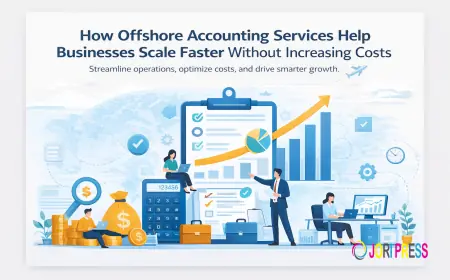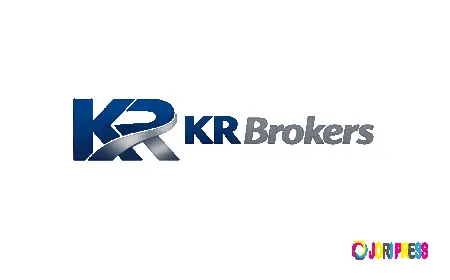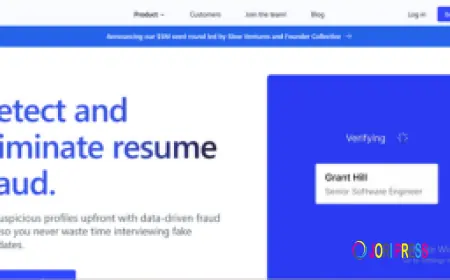Why Corporate Tax Advisory Matters in Today’s Economy
Understand why corporate tax advisory is crucial in today’s economy, helping businesses stay compliant, optimize efficiency, and drive growth.

In today’s rapidly evolving global economy, businesses face complex challenges that extend far beyond managing daily operations. Among the most pressing concerns for enterprises of all sizes is taxation—an area that has become increasingly intricate with globalization, digital commerce, and shifting regulatory frameworks. The role of corporate tax advisory has therefore emerged as a vital service, enabling companies to navigate tax complexities, optimize their obligations, and remain compliant in a competitive market. For many organizations, working with expert corporate tax consultants is no longer optional—it is a strategic necessity.
This article explores why corporate tax advisory matters in today’s economy, the benefits it offers to businesses, and how consultants provide tailored guidance that leads to sustainable growth.
The Growing Complexity of Taxation
Taxation is no longer a straightforward compliance exercise. Governments worldwide are reforming tax policies to align with economic changes, ensure fair practices, and increase revenue. From transfer pricing regulations to digital service taxes, the corporate tax landscape is continuously evolving.
Businesses operating across multiple jurisdictions face additional layers of complexity. Differing tax codes, reporting standards, and international treaties can lead to confusion and potential legal risks if not managed effectively. This is where corporate tax consultants play a crucial role. They analyze regulations in depth, provide clarity on cross-border taxation, and design strategies that allow companies to remain compliant while optimizing their tax positions.
Strategic Value of Corporate Tax Advisory
Traditionally, tax functions were seen as compliance-driven—focused on filing returns and ensuring adherence to regulations. However, the modern economy has transformed taxation into a strategic function. Corporate tax advisory now encompasses risk management, cost efficiency, and long-term planning.
1. Compliance and Risk Management
Non-compliance with tax regulations can lead to significant penalties, reputational damage, and even legal consequences. By leveraging expert guidance, businesses can reduce the risk of audits or disputes. Corporate tax consultants ensure that tax filings are accurate, up to date, and aligned with regulatory requirements, giving companies peace of mind.
2. Tax Optimization
Beyond compliance, effective tax advisory focuses on minimizing liabilities. Consultants identify tax-saving opportunities such as deductions, exemptions, and credits. They help organizations structure their operations in a way that maximizes efficiency without crossing legal boundaries. This optimization directly improves profitability and enhances shareholder value.
3. Supporting Global Expansion
As businesses expand internationally, tax challenges multiply. Different countries impose varying rules on income, withholding, and value-added taxes. Advisory firms provide insights into treaties, double taxation agreements, and foreign compliance, allowing smooth cross-border growth. For expanding enterprises, corporate tax consultants are essential guides.
The Role of Technology in Tax Advisory
The rise of digitalization has introduced new tax considerations, including e-commerce regulations and digital service taxes. At the same time, technology has transformed how tax advisory itself operates. Advanced analytics, artificial intelligence, and cloud-based solutions enable consultants to provide real-time insights, improve accuracy, and streamline reporting.
Businesses that partner with modern advisory firms benefit from data-driven tax strategies. Consultants not only interpret complex regulations but also apply advanced tools to monitor compliance, detect risks, and predict future changes. This combination of human expertise and technology-driven precision ensures businesses stay ahead in today’s fast-moving economy.
Why Businesses Need Corporate Tax Consultants
While many companies attempt to handle taxation internally, the reality is that in-house teams often lack the resources or specialized expertise needed to address intricate tax issues. This is where professional consultants bring significant value.
-
Expert Knowledge – Tax laws are dynamic and vary across industries and regions. Consultants bring updated knowledge and industry-specific expertise that internal teams may not have.
-
Time Efficiency – Managing taxation in-house requires extensive effort, diverting management from core operations. Outsourcing to corporate tax consultants frees up resources.
-
Cost Savings – Although advisory services involve a fee, the tax savings achieved often outweigh the costs.
-
Proactive Planning – Consultants anticipate regulatory changes and advise businesses on preparing for future obligations.
-
Global Perspective – For multinational companies, consultants provide insights that span across jurisdictions, avoiding pitfalls of international taxation.
Impact on Small and Medium Enterprises (SMEs)
While large corporations have long relied on tax advisory, SMEs are increasingly recognizing the benefits of engaging consultants. Smaller businesses often operate with tighter budgets, making tax savings and compliance even more critical. A single error in tax filings can significantly impact financial stability.
Corporate tax consultants assist SMEs by creating tax-efficient structures, ensuring accurate reporting, and providing guidance on investment decisions. This support not only strengthens financial health but also enables SMEs to compete more effectively in their markets.
Tax Advisory in a Globalized Economy
Globalization has interconnected economies, making taxation a transnational concern. Issues such as transfer pricing, permanent establishment rules, and cross-border withholding taxes demand specialized expertise. Corporate tax advisory firms are equipped to manage these challenges by:
-
Structuring international operations to minimize double taxation.
-
Ensuring compliance with OECD guidelines and local laws.
-
Advising on profit repatriation strategies.
-
Supporting mergers, acquisitions, and joint ventures with tax-efficient planning.
For multinational corporations, reliance on corporate tax consultants is essential for sustainable global operations.
The Future of Corporate Tax Advisory
As economies continue to digitize and governments push for transparency, the importance of corporate tax advisory will only grow. Environmental, social, and governance (ESG) considerations are also shaping taxation, with incentives for sustainable practices and stricter scrutiny of corporate responsibility.
Future-focused consultants will combine tax expertise with advisory on ESG, digital compliance, and risk resilience. Their role will evolve into holistic business advisors, helping organizations achieve growth while maintaining ethical and legal integrity.
In today’s economy, corporate tax advisory is far more than a compliance exercise—it is a strategic enabler of business growth and sustainability. With the rising complexity of global tax systems, businesses cannot afford to overlook professional guidance. Whether optimizing tax obligations, managing risks, or preparing for global expansion, the role of corporate tax consultants is indispensable.
By partnering with experienced advisors, businesses position themselves for resilience in a fast-changing world. Taxation may be one of the oldest elements of business, but in today’s economy, strategic tax advisory is what keeps enterprises future-ready.
What's Your Reaction?
 Like
0
Like
0
 Dislike
0
Dislike
0
 Love
0
Love
0
 Funny
0
Funny
0
 Angry
0
Angry
0
 Sad
0
Sad
0
 Wow
0
Wow
0



















































